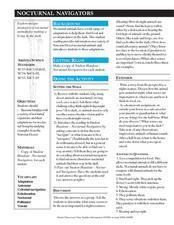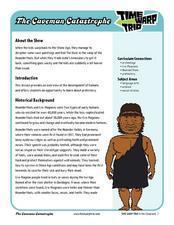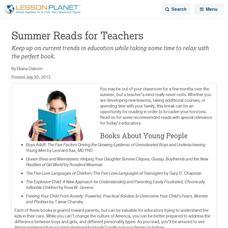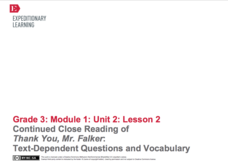SeaWorld
Bird Biology
Here you will find two good activities designed for young learners. In the first one, pupils explore the fact that all birds have feathers, and they discover what two uses those feathers have. After the discussion, the kids color in a...
SeaWorld
Marvelous Manatees
Here is an interesting lesson on the manatee for your upper graders or middle schoolers. A game is played where learners work together to complete a successful manatee migration. It's a board game, and all of the game components are...
Hawaiʻi State Department of Education
Machines
What do science and dance have in common? Simple machines, work, and force! First, children discuss machines, wheels, inclined planes, and wedges. They create inclined planes with their bodies and make up dances about wheels and wedges....
Japan Society
A Remade Environment
Art is a wonderful way to express feelings of social unrest or change. Learners will examine the works of two contemporary Japanese artists, and how they each have used art to say something big. They analyze the work of Katsuhiro Saiki...
Curated OER
Teaching "A Week in the Woods"
The book, A Week in the Woods is the focus of the very interesting language arts activity presented here. After the book has been read, learners engage in study of certain parts of the book in order to gain a better understanding of how...
Desert Discoveries
What's In A Habitat?
The concept of a habitat being a home for animals is the main thrust of this life sciences resource. Learners complete a cut-and-paste activity using a fine worksheet that's embedded in the plan. They must place four very different...
Desert Discoveries
Sizing Up Dinosaurs
Here is a terrific activity in which learners compare their size to the size of actual dinosaurs. Using the magic of the overhead projector and a transparency of the outline of a dinosaur skeleton, pupils can see how big these animals...
Desert Discoveries
Keepers of the Prairie
Young ecologists examine the case of the prairie dog, and their near extinction. They read a terrific student handout embedded in the plan, and engage in a class discussion that's based on what they read. Learners perform research on...
Desert Discoveries
The Sonoran Desert
Elementary schoolers study the geographic location of the Sonoran Desert. They pay close attention to the characteristics of the plants and animals found in this desert environment. The student handouts embedded in this plan are...
Desert Discoveries
Nocturnal Navigators
Young biologists take a look at some of the unique ways that nocturnal animals survive in the dark. After reading a terrific student handout which is embedded in the plan, learners work together to answer questions about what they have...
Desert Discovery
Leaping Lizards
Here is a fine biology lesson that introduces youngsters to reptiles. They study their feeding habits, their habitats, and the adaptations they must make to survive in their environments. The outstanding lesson includes two excellent...
Desert Discoveries
Amazing Arthropods
Arthropods are the stars of a fine science lesson. Learners look at the diversity, characteristics, adaptations, and important roles that these insects play in the Sonoran Desert environment. A terrific document called "Amazing...
Desert Discoveries
Sonoran Desert Predators and Prey
Here is a fabulous lesson the animals found in the Sonoran Desert. Learners classify these animals as predators, prey, or both! They take a look at the many adaptations that these animals utilize to help them find food, and avoid...
Fraction Bars
Subtraction of Decimals
Here is a fabulous lesson on subtracting decimals with different numbers of decimal places. There are teacher-led activities for learners to engage in, including, modeling decimal subtraction through decimal squares, looking at place...
Curated OER
Subtracting Fractions - Unequal Denominators
Subtracting fractions that have unequal denominators is a tricky process. The lesson utilizes fraction bars as a manipulative, in order to understand subtracting fractions and estimating differences. After completing three activities in...
Time Warp Trio
The Caveman Catastrophe
Young archaeologists study the development of human history, and work in groups to create a timeline that traces the development of humans. Additionally, the groups utilize a very clever graphic organizer embedded in the plan in order to...
Oklahoma Ag in The Classroom
Bee Smart Bee Happy
Here is a wonderfully designed lesson on bees and pollination designed for early elementary learners. After a class discussion on bees, pupils pretend to be a bee by picking up nectar off of "flowers" in the class. The flowers are...
Florida Center for Instructional Technology
A Human Number Line: Teacher Notes
Twenty-one pieces of tagboard can lead your class to a greater understanding of integers when you use them to form a human number line. After creating this math tool, two strategies for adding and subtracting will have your...
Curated OER
Summer Reads for Teachers
Keep up on current trends in education while taking some time to relax with the perfect book.
EngageNY
Documenting Research: Sorting and Recording Information About the Wheelwright
Fourth graders practice using a graphic organizer to record their notes and answer text-dependent questions while supplying evidence of how they found their answer. They focus on a machine called the wheelright, which was commonly used...
EngageNY
Writing to Inform: Colonial Trades
Fourth graders who are studying life in colonial America engage in an instructional activity that has them create a "Help Wanted" ad that would have been written by a master craftsperson from back in the day. They utilize a graphic...
EngageNY
Continued Close Reading of Thank You, Mr. Falker: Text Dependent Questions and Vocabulary
In the second lesson plan in a series that revolves around the story, Thank You, Mr. Falker, learners practice the skill of answering direct questions from the text while using complete sentences. After a teacher-led review of how to...
EngageNY
Close Reading of Thank You, Mr. Falker: Identifying the Superpowers of Reading
Third graders read excepts from the story, Thank You, Mr. Falker in order to gain practice in understanding an unfamiliar story by focusing on the details. They use a worksheet, embedded in the plan, which directs them to certain...
EngageNY
Close Reading of That Book Woman: How Did People Access Books in Rural Areas of the United States?
For this ninth lesson plan in a larger beginning-of-the-year unit, close reading skills are used independently to find the gist of the story That Book Woman. Rereading for important details is the targeted skill to unlock a deeper...

























